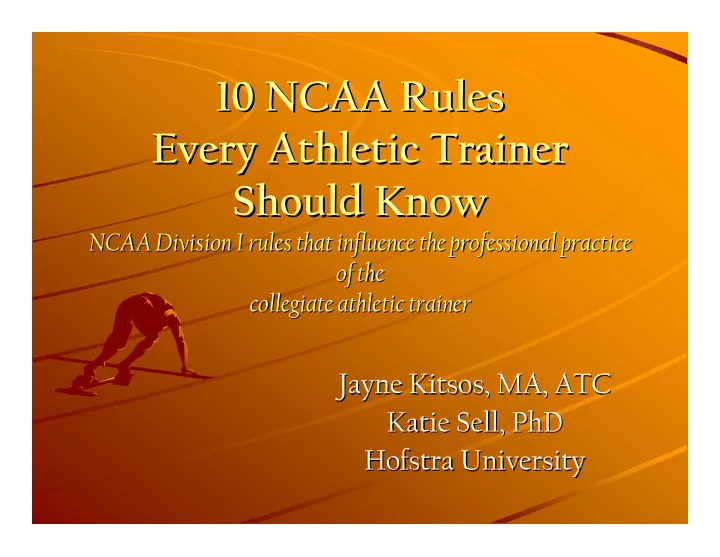

10 NCAA Rules 10 NCAA Rules Every Athletic Trainer Every Athletic Trainer Should Know Should Know NCAA Division I rules that influence the professional practice NCAA Division I rules that influence the professional practice of the of the collegiate athletic trainer collegiate athletic trainer Jayne Kitsos, MA, ATC Jayne Kitsos, MA, ATC Katie Sell, PhD Katie Sell, PhD Hofstra University Hofstra University
Influences on Professional Practice � Federal & State Regulatory Agencies � BOC Standards of Professional Practice � NATA Code of Ethics � NCAA Division I Bylaws & Sports Medicine Handbook � Institutional Policies and Procedures
Regulation Selection Criteria � Language of NCAA Bylaw directly addressed the position of Athletic Trainer � Frequency of Athletic Trainer involvement in both minor and major violations of NCAA Bylaws � Content of NCAA Bylaw is addressed in the NCAA Sports Medicine Handbook
continued Regulation Selection Criteria � Content of NCAA Bylaw is relative to BOC Standards of Professional Practice and NATA Code of Ethics � Content of NCAA Bylaw has the potential to impact the traditional professional responsibilities of the NCAA Division I ATC
NCAA Bylaw, Article 10 ETHICAL CONDUCT
10.1 Ethical Conduct Unethical conduct by a current or former institutional staff member may include the following: Refusal to furnish information relative to an – investigation of a possible violation of NCAA regulations
continued 10.1 Ethical Conduct – Knowingly furnishing the NCAA or institution with false information concerning a violation – Knowing involvement in providing a prospective or enrolled student-athlete an improper inducement or extra benefit
continued 10.1 Ethical Conduct – Knowing involvement in providing a banned substance or supplement to student-athletes, or knowingly providing medications to student- athletes contrary to medical licensure, commonly accepted standards of care in sports medicine practice, or state or federal law
10.2 Knowledge of Banned Drug Use A NCAA member institution’s athletics department staff members who have knowledge of a student-athlete’s use of a substance on the list of banned drugs shall follow institutional procedures dealing with drug abuse or shall be subject to disciplinary or corrective action
NCAA Bylaw, Article 13 RECRUITING
13.2.1 Offers & Inducements General Regulations An institution’s staff member may not be involved in making arrangements for the offering to give financial aid or other benefits to a prospective student-athlete. This may include: � Employment � Cash, loans, or reduced fee services � Tangible items (Clothes, tickets, equipment)
13.2.7 Use of Training-Room Facilities A prospective student-athlete who has signed a National Letter of Intent and is enrolled in the institution’s summer term may use the training-room facilities. (All other PSA may not access the facility until team pre-season training begins)
NCAA Bylaw, Article 16 AWARDS, BENEFITS & EXTRA EXPENSES FOR ENROLLED STUDENT-ATHLETES
16.4.1 Permissible Medical Expenses Permissible medical expenses incidental to student-athlete participation include: � Athletics Medical Insurance (not personal insurance) � Drug rehab expenses � Disordered eating counseling expenses � Glasses, lenses, or protective eye ware � Medical exams and related expenses � Expenses for medical treatment, including transport
16.11.2.1 Benefits, Gifts & Services General Rule for Non-permissible Benefits The student-athlete shall not receive any extra benefit An extra benefit refers to any special arrangement by an institutional employee to provide a benefit not authorized by the NCAA
continued 16.11.2.1 Benefits, Gifts & Services Non-permissible benefits include: � Discounts or credits for a purchase or service � Free or reduced-cost services � Personal use of telephone or credit card � Entertainment services (i.e. additional game tickets) � Money or loan of money � Use of an automobile or other transportation
NCAA Bylaw, Article 17 PLAYING & PRACTICE SEASONS
17.02.13 Voluntary Athletic Activities In order for athletic activity to be voluntary all of the following conditions must be met: – Athlete is not required to report back to athletics department staff members (including AT) – Activity is requested solely by the athlete – Attendance is not recorded – No penalty is received for not participating
17.1.6 Time Limits for Athletic Activity During the playing season the following limits apply: – 4 hrs per day / 20 hrs per week – 1 day off within every 7 day period – Practice prohibited after a competition Time limits do not apply during vacation periods and athlete treatment time is not included in the countable hours of activity
continued 17.1.6 Time Limits for Athletic Activity Outside of the playing season the following limits apply: – 8 hrs per week – 2 day off per every 7 days – Activity prohibited 1 week prior to final exams – Activity prohibited during vacation periods
17.1.5 Mandatory Medical Examination Prior to participation, student-athletes beginning their initial season of eligibility an required to undergo a medical exam by a physician within 6 months of participation In following years, an updated medical history shall be administered by an institutional medical staff member
Strength Coaches 17.11.6.1 Conducting Non-mandatory Practice Session In relation to the sport of football… A member of the sports medicine staff must be present during all non-mandatory conditioning activities conducted by the strength coach
continued Strength Coaches 17.11.6.1 Conducting Non-mandatory Practice Session The sports medicine staff member must be empowered to have the unchallengeable authority to cancel or modify the workout for health and safety reasons, as he or she deem appropriate
References National Collegiate Athletics Association. (2007). 2007-08 NCAA Division I Manual. Indianapolis, IN: NCAA National Collegiate Athletics Association. (2007). 2007-08 Sports Medicine Handbook. Indianapolis, IN: NCAA National Collegiate Athletics Association. Legislative Services Database for the Internet. Retrieved November 2, 2007, from http://goomer.ncaa.org/wdbctx/LSDBis/lsdbi.home. Board of Certification. (2006). BOC Standards of Professional Practice. Retrieved June 5, 2007, from http://www.bocatc.org/images/stories/multiple_references/stand ardsprofessionalpractice.pdf
Recommend
More recommend